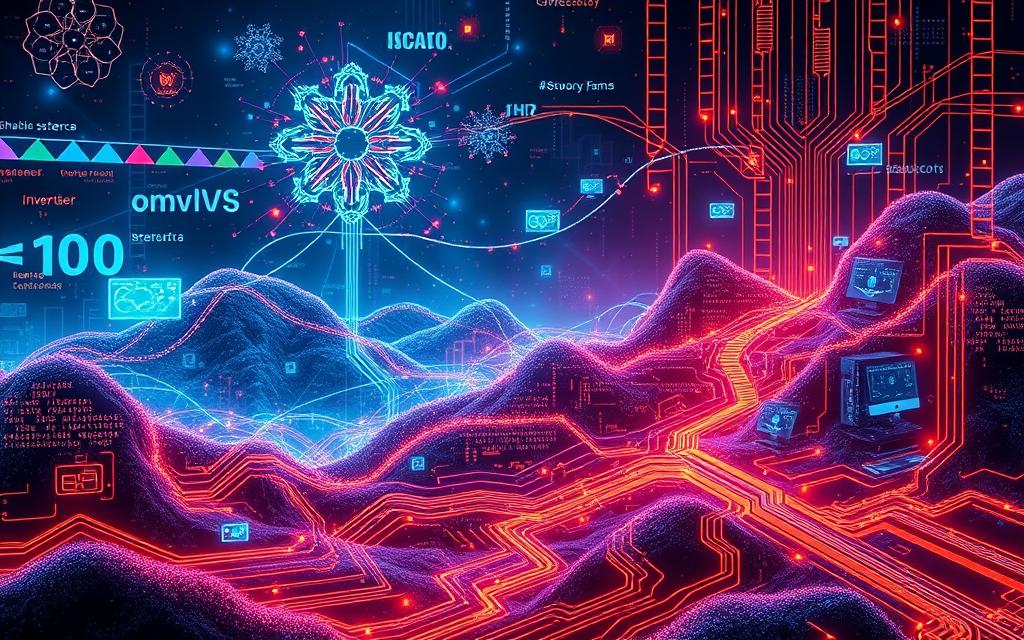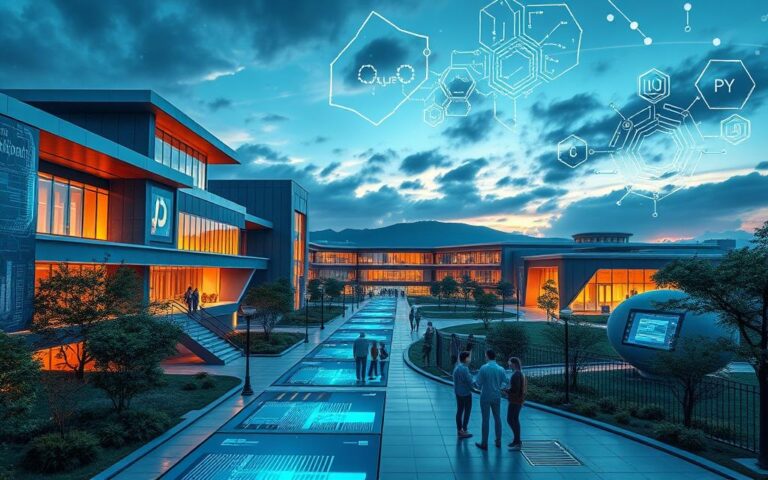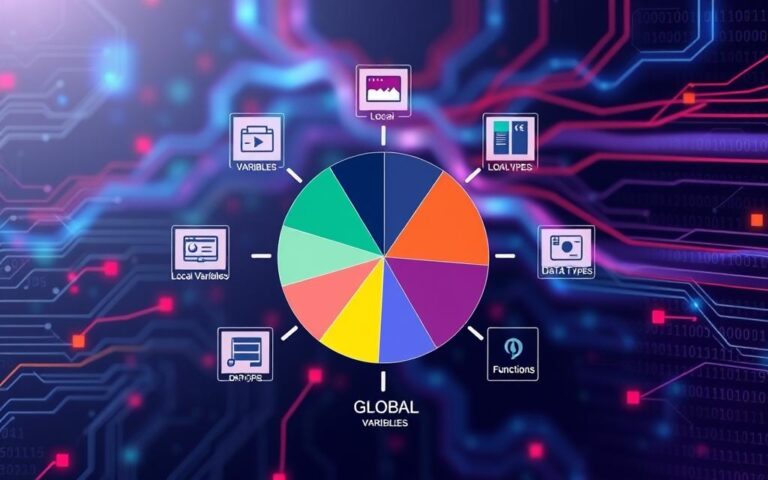Is Computer Science Part of Information Technology (IT)?
Today, many people mix up computer science and information technology (IT). They think these terms mean the same thing. However, even though both deal with computers, they focus on different areas. It’s vital to understand how CS and IT differ, especially if you aim for a career in tech.
This article will clear up what computer science and IT really mean. We’ll dive into the specific fields within computer science and explore the varied jobs in IT. Knowing the differences between computer science and information technology can broaden your understanding. It might even spark your interest in pursuing a rewarding job in one of these fields.
Understanding the Basics of Computer Science
Computer science is always changing. It is very important in today’s world. It deals with how we understand calculation and how we manage information. It combines theory with practice to make our lives better.
Definition and Scope of Computer Science
At its core, computer science is about studying algorithms, data structures, and computer systems. It’s a broad field that covers software development, artificial intelligence, and cybersecurity. This field links theoretical ideas with real uses. It helps make complex software and tools to solve actual problems.
Core Concepts in Computer Science
To get into computer science, you need to know its main ideas. These include:
- Algorithms: These methods or steps solve problems and are key to computer thinking.
- Data Structures: They’re used to store and arrange data well, which helps in handling and accessing data efficiently.
- Software Engineering: This is about making software applications, combining theory and practice.
- Human-Computer Interaction: This area looks at designing and checking user interfaces to make them easy to use and improve the user’s experience.
What is Information Technology?
Information Technology (IT) is about using technology to handle and manage information well. It’s vital in many fields, making sure companies work smoothly and safely. This area covers essential elements for digital systems and operations to run without problems.
Overview of Information Technology
IT involves organizing computer systems and managing information. IT experts work on fixing problems, keeping hardware up to date, and improving systems’ efficiency. They’re key to making sure technical issues are solved quickly and security rules are strict.
Key Areas Within IT
IT has several important areas:
- Cybersecurity: It’s about keeping systems and data safe from threats and having recovery plans ready.
- System Administration: This involves managing the IT setup of an organization.
- Network Management: This area is about looking after connectivity and ensuring networks work well.
- Database Administration: It deals with organizing data to make sure it’s secure and easy to access.
- Technical Support: Provides help to users and fixes issues when they happen.
With technology’s rising demand, managing IT systems well is increasingly important. IT experts not only keep systems running but also tackle new challenges. This way, they boost businesses’ efficiency and security.

Key Differences Between Computer Science and Information Technology
Finding out the differences between computer science and information technology is key for careers in these areas. They differ in their focus areas and what workers do in their jobs. Each field offers unique chances for success and growth.
Focus Areas of Each Discipline
The focus areas of computer science are theory-based. They work on creating algorithms, software, and apps. These innovations push technology forward. Experts in this field work in areas like:
- Artificial Intelligence
- Software Engineering
- Data Science
- Robotics
Information technology focuses on using and fixing computer systems in businesses. IT experts make sure technology works well and safely. They work in areas such as:
- Network Management
- Database Administration
- Cybersecurity
- Cloud Computing
Looking deeper into the differences between CS and IT shows each path meets different needs in society.
Responsibilities of Professionals in Computer Science vs IT
There’s a clear difference in jobs between CS and IT. Computer scientists solve tough problems. They create new tech or make software better through research. But, IT professionals have a more hands-on role. They focus on:
- Installing and configuring technology solutions
- Maintaining hardware and software systems
- Providing technical support to users
When thinking about CS vs IT careers, earnings are also different. Computer engineers earn more due to their special skills. Some job titles and salaries are:
| Job Title | Average Salary |
|---|---|
| Artificial Intelligence Engineer | $131,490 |
| Software Engineer | $120,730 |
| Robotics Engineer | $101,758 |
| Data Scientist | $100,910 |
| Computer Programmer | $93,000 |
IT roles, important but with slightly lower salaries, include jobs such as:
| Job Title | Average Salary |
|---|---|
| Enterprise Architect | $120,520 |
| Cloud Engineer | $121,498 |
| Cybersecurity Specialist | $102,600 |
| Database Administrator | $97,710 |
| Network Administrator | $80,600 |
This info highlights the big differences between CS and IT. It helps future workers choose paths fitting their interests and career goals.
Is Computer Science Under IT?
The relationship between computer science and information technology is complex. It’s about how they come together and differ. Understanding their relationship helps guide careers in these areas.
Exploring the Relationship Between the Two Fields
Some people think computer science is just part of IT. But it’s actually more connected. The overlap between CS and IT shows in jobs needing both skills. For example, cloud computing and database management mix CS and IT know-how.
IT experts need to know some computer science. This knowledge helps them manage and upgrade software efficiently. Sectors like aerospace and healthcare show how these fields work together. The Bureau of Labor Statistics says computer scientist jobs will grow by 11% from 2020 to 2030. This highlights their value in tech-driven industries.
Technology advances create new opportunities in IT and CS. Mixing CS principles into IT roles prepares professionals for changes. To dive deep into these areas, consider exploring the differences between computer science and. It can offer insights into their roles and career paths.
Educational Pathways: Computer Science vs Information Technology
In the tech world, you can choose from different learning paths. These depend on if you like computer science or information technology more. Each path offers many job chances, needing a good knowledge base. Understanding computer science and information technology degrees can really help you succeed in this growing area.
Typical Degrees and Qualifications Required
To work in this field, a Bachelor’s degree in Computer Science is often needed. This degree covers hard maths and programming, building skills in making software and solving theoretical problems. On the other hand, a Bachelor’s in Information Technology focuses on using tech practically. It includes managing data systems, running projects, and protecting against cyber threats. Both areas can lead to extra certifications that employers look for.
Skills Acquired Through Different Programs
The skills you get from these courses are quite different. Computer science students learn about coding, making algorithms, and exploring artificial intelligence. This nurtures thinking skills and creativity. Meanwhile, information technology students get good at solving problems and communicating. They learn how to manage systems that fit with business goals. Knowing the skill differences prepares grads for various jobs. These range from making software to managing IT projects. This opens up many chances for career advancement in a field that’s expected to keep growing.
FAQ
What is the difference between computer science and information technology?
Computer science is about theory and making algorithms. Information technology uses technology to manage and process info. They share some common ground but mainly, they aim at different goals.
Are there career opportunities in both fields?
Yes, there are loads of career paths in both areas. Computer scientists work on software and programming. IT experts work on managing systems, networks, and data. Knowing both can open more doors for you.
What qualifications are typically required for a career in computer science?
To get into computer science, you often need a Bachelor of Science in Computer Science. This includes studying algorithms, data structures, and how to develop software. Getting more certifications can also improve your job options.
How do IT professionals implement computer science principles?
IT pros use computer science ideas to set up and look after computer systems. Knowing about data structures helps them manage databases. And understanding algorithms aids in fixing tech problems.
Do computer science students learn practical IT skills?
Computer science students mainly learn theory, like coding and solving problems. They might get some practical skills from projects and internships. Yet, IT courses offer more hands-on training for managing systems and improving infrastructure.
What are the key areas within information technology?
Key areas in IT include system admin, network management, managing data, and protecting against cyber attacks. Each part is crucial for tech’s smooth running and safety in companies.
Can I transition from computer science to information technology?
Switching from computer science to IT is doable. The problem-solving and software know-how from computer science are very useful in IT. This makes moving into IT roles smoother.
Is hands-on experience important in both fields?
Certainly! In computer science, hands-on means coding projects and creating software. In IT, it’s about doing real tasks like setting up networks and fixing systems. Both fields value practical experience highly.















